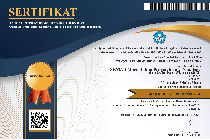Climate Change Camp: Metode Peningkatan Kesadaran Generasi Muda dalam Beradaptasi dan Memitigasi Perubahan Iklim
Abstract
Perubahan iklim menjadi kekhawatiran masyarakat di seluruh dunia selama bertahun-tahun. Kepedulian terhadap lingkungan dan kesadaran mengendalikan perubahan iklim perlu dilakukan oleh semua kalangan masyarakat. Generasi muda, khususnya siswa tingkat SMA/K adalah kalangan yang dirasa paling tepat dijadikan sebagai agen pengendali perubahan iklim. Pendidikan dan peningkatan pemahaman terkait adaptasi dan mitigasi perubahan iklim kepada generasi muda dirasa akan lebih efektif jika dilakukan dengan cara yang unik dan menyenangkan. Climate Change Camp adalah kegiatan camping yang berisi serangkaian acara dengan tujuan utama penyampaian materi, didukung dengan alat peraga pendidikan, serta dikemas dengan kegiatan lain seperti malam keakraban, games, dan olahraga. Hasilnya menunjukkan bahwa penyampaian materi dengan metode ini dapat meningkatkan pemahaman dan kesadaran akan perubahan iklim dan pemanasan global, serta siswa paham apa yang harus mereka lakukan untuk beradaptasi dan memitigasi terjadinya perubahan iklim. Target capaian mencapai mencapai 96% dalam memahami pengertian dan perbedaan perubahan iklim dan pemanasan global, 100% dalam memahami jenis-jenis kegiatan yang mendorong terjadinya pemanasan global, 93% dalam meningkatkan kesadaran akan bahaya dan dampak pemanasan global, serta 93% dalam memahami tindakan yang harus dilakukan untuk meningkatkan kesadaran masyarakat terhadap perubahan iklim. Climate Change Camp dapat dijadikan salah satu metode pembentukan generasi muda sebagai bagian dari agen pengendalian perubahan iklim..
Climate change has been a concern for people around the world for years. Concern for the environment and awareness of controlling climate change needs to be carried out by all levels of society. The younger generation, especially senior high school level students, are the people who are deemed most appropriate to act as agents to control climate change. It is felt that education and increasing understanding regarding climate change adaptation and mitigation for the younger generation will be more effective if done in a unique and fun way. Climate Change Camp is a camping activity that contains a series of events with the main aim of delivering material, supported by educational props, and packaged with other activities such as social evenings, games and sports. The results show that delivering material using this method can increase understanding and awareness of climate change and global warming, and students understand what they must do to adapt and mitigate climate change. The target achievement is to reach 95% in understanding the meaning and differences between climate change and global warming, 96% in understanding the types of activities that encourage global warming, 93% in increasing awareness of the dangers and impacts of global warming, and 93% in understanding the actions taken must be done to increase public awareness of climate change. Climate Change Camp can be used as a method of forming the younger generation as part of climate change control agents.
Full Text:
PDFReferences
Akin, S., Calik, B., & Engin-Demir, C. (2017). Students as change agents in the community: Developing active citizenship at schools. Kuram ve Uygulamada Egitim Bilimleri, 17(3), 809–834. https://doi.org/10.12738/estp.2017.3.0176
Azizah, N., & Banowati, E. (2015). Pelaksanaan Sekolah Lapangan Iklim (SLI) dalam Memberikan Pemahaman Mitigasi dan Adaptasi Perubahan Iklim pada Petani di Kelurahan Banyuurip Ageng Kecamatan Pekalongan Selatan. Edu Geography, 3(6), 9–15. http://journal.unnes.ac.id/sju/index.php/edugeo
Faizal, A., Wahyurianto, R., Ali, Z., AL, M. F., Nurcahayani, I., & Rosyadi, M. I. (2022). Implementasi Metode Outing Class terhadap Pendidikan Konservasi, Perubahan Iklim dan Mitigasi Lingkungan. Proceeding Biology Education Conference, 19(1), 107–119.
Fajrini, F., Herdiansyah, D., Aulia, L., Lusida, N., Fauziah, M., Kesehatan Masyarakat, F., Muhammadiyah Jakarta, U., & Author, C. (2023). Environmental Occupational Health and Safety Journal Analisis Perubahan Iklim dan Kesehatan Mental pada Mahasiswa Fakultas Kesehatan Masyarakat Universitas Muhammadiyah Jakarta. Environmental Occupational Health and Safety Journal •, 3(2), 95.
Hatmojo, D. S. (2020). Efektivitas Pelaksanaan Penyuluhan Pengendalian Perubahan Iklim Dan Kehutanan Di Madrasyah Aliyah Aulia Cendekia Palembang. Jurnal Imiah Management Agribisnis (Jimanggis), 1(1), 59–68. https://doi.org/10.48093/jimanggis.v1i1.43
Madyawati, L., Zubadi, H., & Laely, K. (2019). Urgensi pengembangan edukasi bencana berbasis ramah anak. 2018, 301–305. https://publikasiilmiah.ums.ac.id/xmlui/handle/11617/10825%0Ahttps://publikasiilmiah.ums.ac.id/xmlui/bitstream/handle/11617/10825/All-Paper-v0-4_46_ Urgensi Pengembangan Edukasi Bencana_pdf %28p_30_36.pdf?sequence=1&isAllowed=y
Malihah, L. (2022). Tantangan Dalam Upaya Mengatasi Dampak Perubahan Iklim Dan Mendukung Pembangunan Ekonomi Berkelanjutan: Sebuah Tinjauan. Jurnal Kebijakan Pembangunan, 17(2), 219–232. https://doi.org/10.47441/jkp.v17i2.272
Meusburger, P., Werlen, B., & Suarsana, L. (2017). Knowledge and Action (Knowledge and Space Volume 9). http://www.oapen.org/search?identifier=1002228
Monroe, M. C., Plate, R. R., Oxarart, A., Bowers, A., & Chaves, W. A. (2019). No Identifying effective climate change education strategies: a systematic review of the research, Environmental Education Research. 25(6), 791–812. https://doi.org/https://doi.org/10.1080/13504622.2017.1360842
Patrianti, T., Shabana, A., & Tuti, R. W. (2020). Government Risk Communication on Greenhouse Gas Emission Reduction to Tackle Climate Change. Jurnal Penelitian Komunikasi Dan Opini Publik, 24(2). https://doi.org/10.33299/jpkop.24.2.3416
Rousell, D., & Citter-Mackenzie-Knowles, A. (2020). A Systematic Review of Climate Change Education: Giving Children and Young People a ‘Voice’ and a ‘Hand’ in reddressing Climate Change. Children’s Geographies, 18(2), 191–208. https://doi.org/https://doi.org/10.1080/14733285.2019.1614532
Sagena, U. W., Azizsyah, S. N., Panjaitan, O., Masjaya, M, M. H., & Sharifuddin, M. D. K. (2023). Program triple
C (Climate Change Class) untuk peningkatan kesadaran lingkungan bagi anak. JMM (Jurnal Masyarakat Mandiri), 7(4), 1–7.
Sahendra, Y., Amanda, S. R., Faradela, S. A., Fahrimal, Y., & Husna, A. (2023). Revitalisasi Peran Pemuda Dalam Gerakan Sosial Peduli Perubahan Iklim Di Era Digital Revitalizing the Role of Youth in Social Movements Concerning Climate Change in the Digital Age. JASIMA:Jurnal Komunikasi Korposasi Dan Media, IV(1), 1–14. https://www.jasima.fisip-unmul.ac.id/site/index.php/jasima/article/view/57
Santos, R. M., & Bakhshoodeh, R. (2021). Climate change/global warming/climate emergency versus general climate research: comparative bibliometric trends of publications. Heliyon, 7(11), e08219. https://doi.org/10.1016/j.heliyon.2021.e08219
Zukmadini, A. Y., & Rohman, F. (2023). Edukasi Mitigasi Dan Adaptasi Perubahan Iklim Menggunakan Film Dokumenter. Kumawula: Jurnal Pengabdian Kepada Masyarakat, 6(1), 191. https://doi.org/10.24198/kumawula.v6i1.39503
Refbacks
- There are currently no refbacks.























